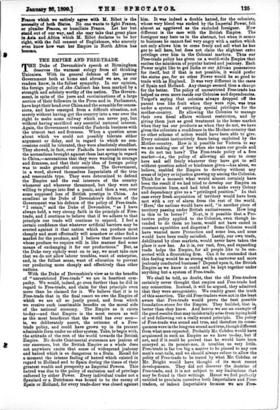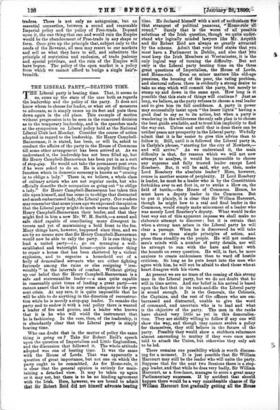THE EMPIRE AND FREE-TRADE.
THE Duke of Devonshire's speech at Birmingham deserves the warmest eulogy from all thinking Unionists. With its general defence of the present Government both at borne and abroad we are, as our readers know, in the fullest sympathy. In our opinion, the foreign policy of .the .Cabinet has been marked by a strength and sobriety worthy of the nation. The Govern- ment, in spite of the jeers and recriminations of a large section of their followers in the Press and in Parliament, have kept their head over China and the scramble for conces- sions, and have emerged from a difficult situation, not merely without having got the country into a war over the right to make some railway which can never pay, but without having sacrificed any essential national interest. Again, the Government treated the Fashoda business with the utmost tact and firmness. When a question arose about which we could not possibly tolerate either argument or delay, and in regard to which no con- cessions could be tolerated, they were absolutely steadfast. They showed, in fact, over Fashoda how monstrous were the accusations brought against them last spring in regard to China,—accusations that they were wanting in courage and firmness, and that their only idea of foreign policy was to make graceful concessions. The Government, in a word, showed themselves Imperialists of the true and reasonable type. They were determined to defend the Empire and the real interests of the country whenever and wherever threatened, but they were not willing to plunge into first a panic, and then a war, over some supposed loss of British prestige in China. As excellent as the Duke of Devonshire's defence of the Government was his defence of the policy of Free-trade. " I retain," said the Duke of Devonshire, "as I have always held, a very strong faith in the principle of Free- trade, and I continue to believe that if we adhere to that principle our trade will continue to expand. I feel a certain confidence that whatever artificial barriers may be erected against it that nation which can produce most cheaply and most effectually will somehow or other find a market for the produce, and I believe that those nations whose produce we require will in like manner find some means of exchanging it for our productions." But, as the Duke very rightly went on to say, we must take care that we do not allow labour troubles, want of enterprise, and, in the fullest sense, want of education to prevent our producing more cheaply and effectively than other nations.
With the Duke of Devonshire's view as to the benefits of "unrestricted Free-trade" we are in heartiest sym- pathy. We would, indeed, go even further than he did in regard to Free-trade, and claim for that principle even more than he claimed for it. We believe that it is to Free-trade that in the final resort we owe the Empire of which we are all so justly proud, and from which we receive such inestimable benefits on the moral side of the national economy. The Empire as it exists to-day—and that Empire is the most secure as well as the most beneficent that the world has ever seen— is, we deliberately assert, the outcome of a Free- trade policy, and could have grown up in its present admirable form under no other system. Take, to begin with, the attitude of the rest of the world towards the British Empire. No doubt Continental statesmen are jealous of our successes, but the British Empire as a whole does not anywhere excite that sense of widespread jealousy and hatred which is so dangerous to a State. Recall for a moment the intense feeling of hatred which existed in regard to Holland and to Spain during the times of their greatest wealth and prosperity as Imperial Powers. This hatred was due to the policy of exclusion and of privilege enforced by either Power. Every individual trader not a Spaniard or a Dutchman was bound to be the enemy of Spain or Holland, for every trade-door was closed against him. It was indeed a double hatred, for the colonists, whose very blood was sucked by the Imperial Power, felt almost as aggrieved as the excluded foreigner. How different is the case with the British Empire. The foreigner may hate us in the abstract, but when it comes to business he cannot feel very angry with a nation which not only allows him to come freely and sell what he has got to sell here, but does not claim the slightest extra privilege over him in the Colonial markets. Thus our Free-trade policy has given us a world-wide Empire that excites the minimum of popular hatred and jealousy. Each Power might like to get India or our African possessions for itself, but if that is not possible, it would prefer the status Tito, for no other Power would be so good to trade with as England. It was very different in the cases of Spain and Holland. Any change seemed then a change for the better. The policy of unrestricted Free-trade has helped us even more inside our Colonies and dependencies. Turgot's saying that colonies always dropped off the parent tree like fruit when they were ripe, was true under a system of extorting special privileges for the mother-country. By allowing the Colonies to manage their own fiscal affairs without restriction, and by giving them just as good treatment in the home market when they tax our products as when they do not, we have given the colonists a confidence in the Mother-country that no other scheme of action would have been able to give. Every colonist instinctively fears being exploited by the Mother-country. How is it possible for Victoria to say we are making use of her when she taxes our goods and we do not tax hers ? The Free-trade policy of a free market—i.e., the policy of allowing alt men to come here and sell freely whatever they have got to sell without question asked or hindrance given—has alone, we believe, enabled the Empire to develop without any sense of injury or injustice growing up among the Colonies. Think for a moment what would almost certainly have been the result if we had tried to develop our Empire on Protectionist lines, and had tried to make every Colony and dependency give us a "privileged position." In that case every fresh acquisition of territory would have been met with a cry of alarm from the rest of the world. 'Here,' the nations would have said, is another piece of territory passing under British exclusiveness. How long is this to be borne ? ' Next, is it possible that a Pro- tective policy applied to the Colonies, even though in- tended to do them no harm, would not have ended in constant squabbles and disputes ? Some Colonies would have wanted more Protection and some less, and none would have been really satisfied. Lastly, our own trade, debilitated by close markets, would never have taken the place it now has. As it is, our vast, free, and expanding trade helps the Empire, for all people like to be con- nected with a flourishing firm. Can it be contended that this feeling would be as strong with a narrower and more jealously conducted business ? Depend upon it, the British Empire as we know it could not be kept together under anything but a system of Free-trade.
We shall be told, no doubt, that the old Free-traders certainly never thought that empire and Free-trade had any connection. Instead, it will be argued, they admitted that they were antagonistic. We readily grant the truth of this assertion. The old Free-traders were not in the least aware that Free-trade would prove the best possible foundation-stone for the Empire. They builded, that is, better than they knew. And herein we see an example of the good results that may incidentally arise from laying hold of and following out a really sound principle. The policy of Free-trade was sound and true, and therefore its conse- quences were in the long run sound and true, though different from what men expected. Probably Mr. Cobden would have acquiesced in such an Empire as we have to-day, but if not, and if it could be proved that he would have been annoyed az its persistence, it troubles us very little. Free-trade is far to big a matter to be pinned to any one man's coat-tails, and we should always refuse to allow the policy of Free-trade to be tested by what Mr. Cobden or Mr. Bright would have thought of its most recent developments. They did not discover the doctrine of Free-trade, and it is not subject to any lituitations that may be found in their writings. Hence we feel perfectly entitled to proclaim ourselves both Imperialists and Free- traders, or indeea Imperialists because we are Free. traders. There is not only no antagonism, but an essential conneetion, between a sound and reasonable Imperial policy and the policy of Free-trade. Depend upon it, the one thing that can and would ruin the Empire would be the abandonment of Free-trade in any shape or form. Once give up the principle that, subject only to the needs of the Revenue, all men may resort to our markets and sell us what they have to sell, and substitute the principle of restriction and exclusion, of trade jealousy and special privilege, and the rain of the Empire will have begun. The policy of the open market is a policy from which we cannot afford to budge a single hair's- breadth.



















































 Previous page
Previous page